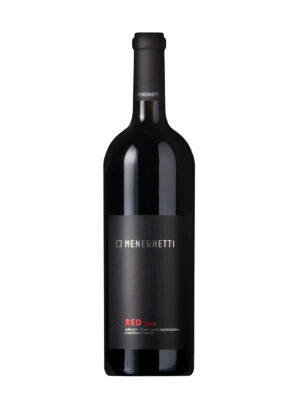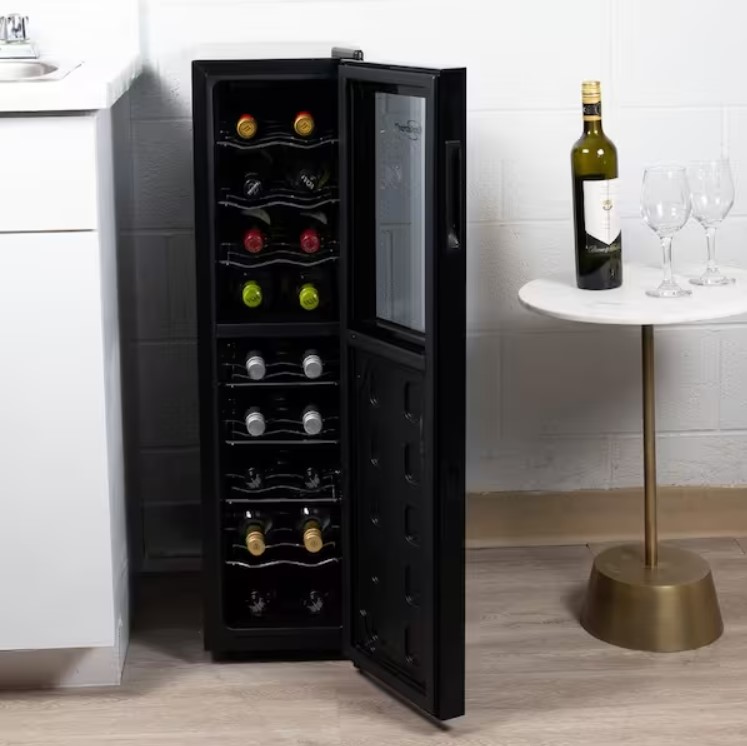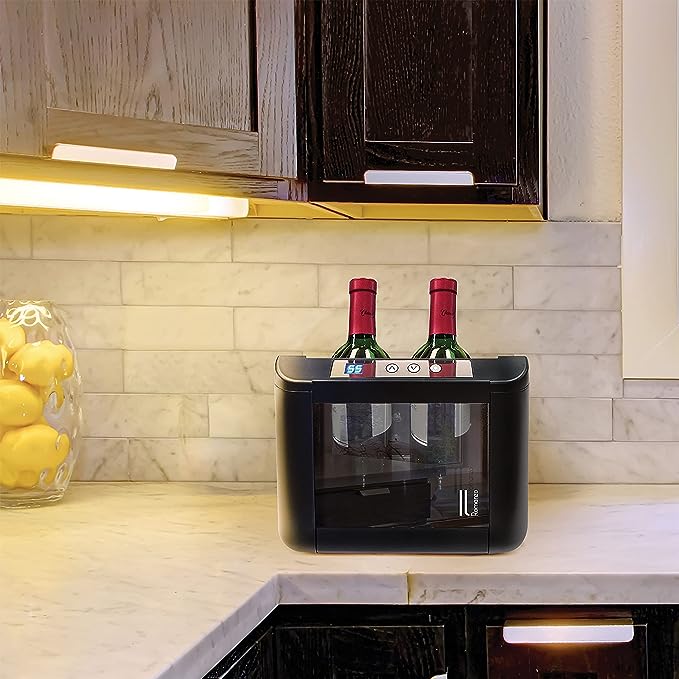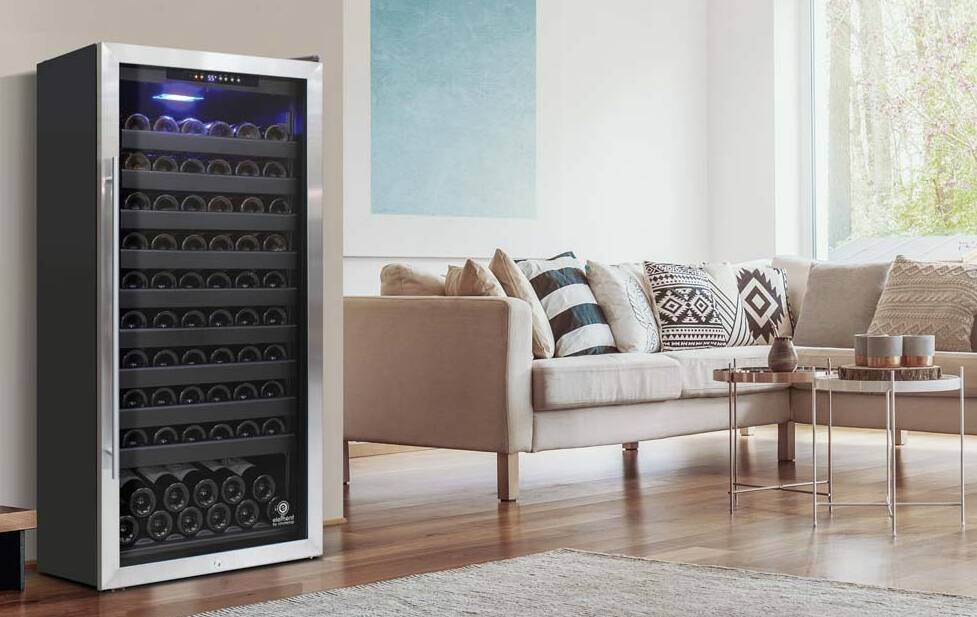Complete Guide To Types Of Wine Coolers
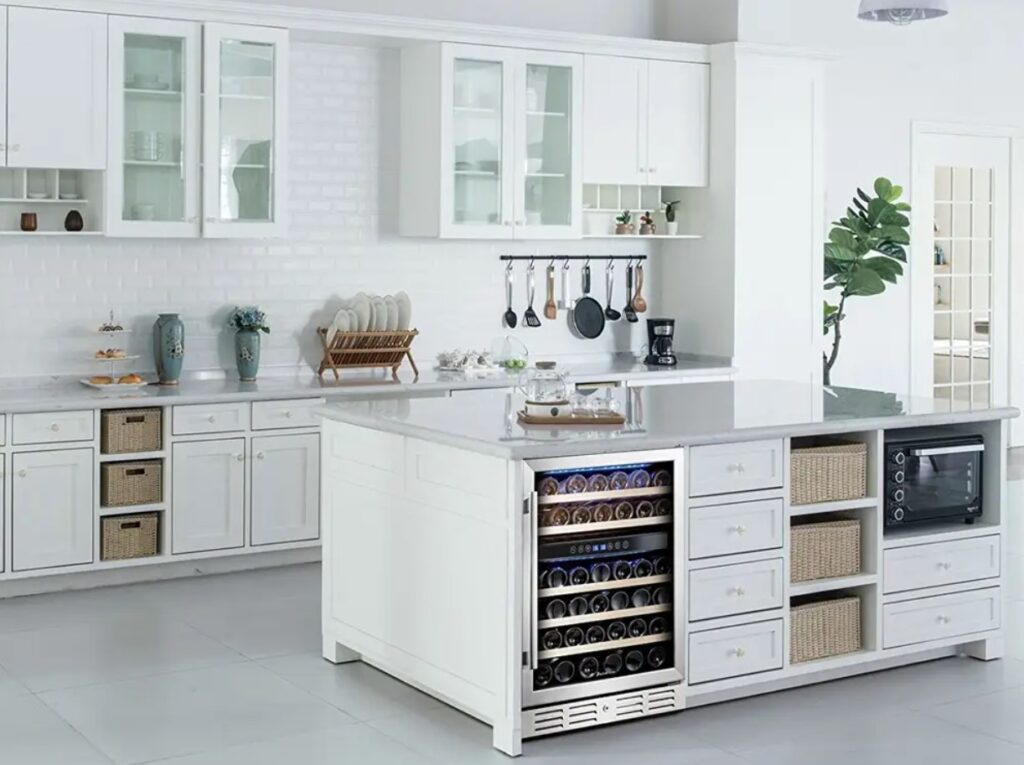
When it comes to enjoying wine at its best, temperature control is critical. Wine connoisseurs and enthusiasts understand that the right serving temperature can make or break the tasting experience. This is where wine coolers come into play. In this comprehensive guide, we’ll delve into the world of wine coolers, exploring their types, features, and everything you need to know to elevate your wine storage and serving game.
The importance of wine storage
When it comes to enjoying a fine bottle of wine, the art of storage is often overlooked. Many wine enthusiasts debate whether investing in a wine cooler is essential or an extravagant luxury.
Wine storage isn’t just about keeping your bottles chilled; it’s a delicate art form. Proper wine storage ensures that your wines age gracefully, preserving their flavors and aromas.
Traditional refrigerators are not designed for this purpose, as they operate at temperatures too cold for wine and lack the necessary humidity control.
For wine to reach its full potential, it demands optimal storage conditions. Experts agree that wines are best stored at a constant temperature of around 55°F (13°C). Humidity levels between 50-70% are ideal, preventing corks from drying out and causing oxidation.
Moreover, wine should be shielded from direct sunlight and stored in a vibration-free environment.
Types of wine coolers
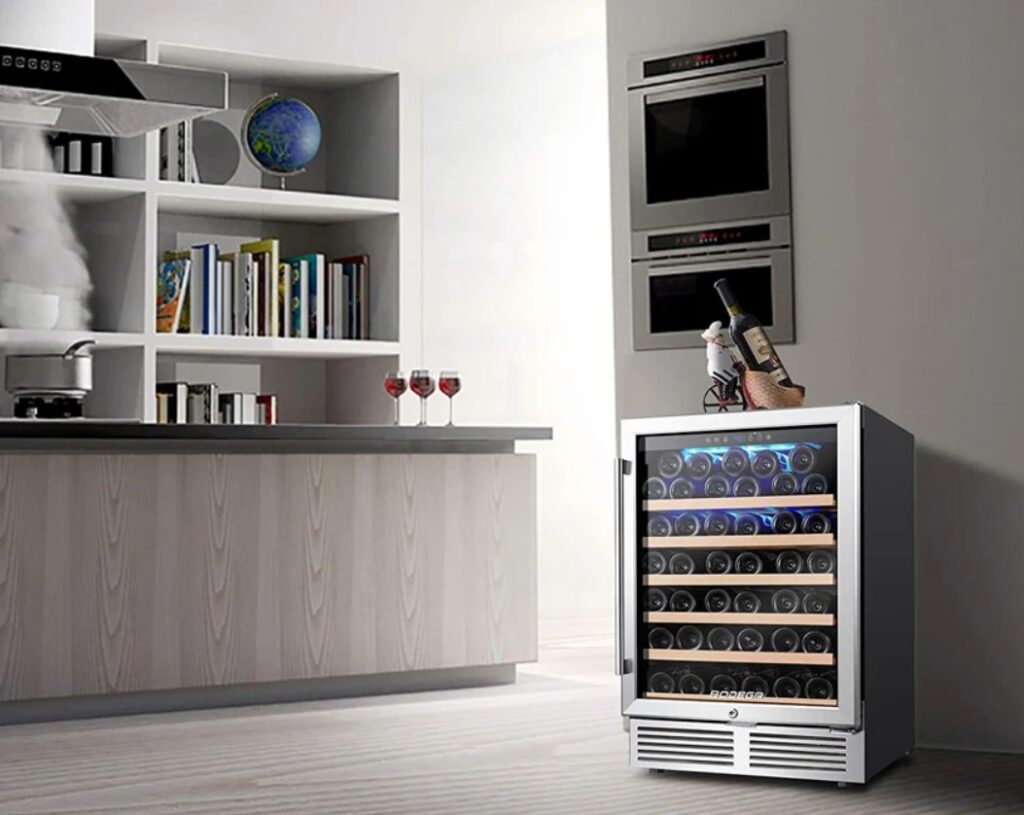
Now, let’s unravel the diverse world of wine coolers. From traditional wine cellars to modern wine refrigerators, there’s a perfect solution for every wine enthusiast.
Single-zone wine coolers
Perfect for those who primarily collect one type of wine, single-zone wine coolers maintain a consistent temperature throughout. Whether you’re a red, white, or sparkling wine enthusiast, a single-zone cooler ensures your bottles are stored at the ideal temperature for your preferred varietal.
- Pros:
- Simplicity: Ideal for those who primarily collect one type of wine.
- Affordable: Generally more budget-friendly than multi-zone models.
- Energy Efficiency: Consumes less energy compared to dual-zone coolers.
- Cons:
- Limited Flexibility: Not suitable for storing and serving multiple wine varieties simultaneously.
- Less Versatility: May not cater to the diverse preferences of a wine enthusiast.
Dual-zone wine coolers
If you enjoy both reds and whites, a dual-zone wine cooler is a must-have. These coolers feature two separate compartments with distinct temperature zones, allowing you to store and serve different wine varieties simultaneously. It’s a game-changer for those who appreciate the nuances of temperature-sensitive wines.
- Pros:
- Temperature Flexibility: Dual-zone coolers have two separate compartments, allowing you to store both red and white wines at their ideal temperatures.
- Precise Control: Allows you to customize temperature settings for each compartment.
- Enhanced Organization: You can categorize your wine collection effectively.
- Ideal for Entertaining: Perfect for hosting wine tasting events with a variety of wine types.
- Cons:
- Higher Price: Dual-zone coolers tend to be pricier than single-zone models.
- Space Requirement: They may be larger and require more space compared to single-zone counterparts.
|
$277.99
|
N/A
|
$1,091.10
|
Multi-zone wine coolers
When diversity is the name of the game, multi-zone wine coolers step in to accommodate your varied collection. With multiple temperature compartments, these coolers allow you to store different types of wines, ensuring each bottle is preserved and ready for enjoyment.
- Pros:
- Versatility: Perfect for storing and serving multiple wine types simultaneously.
- Customization: Allows precise temperature control for each zone.
- Ideal for Wine Enthusiasts: Caters to a wide range of preferences.
- Cons:
- Cost: Typically more expensive than single-zone models.
Space Requirement: May require more space due to multiple compartments.
- Cost: Typically more expensive than single-zone models.
Built-in wine coolers
Sleek, space-saving, and stylish – that’s what built-in wine coolers bring to the table. Designed to seamlessly integrate into your kitchen or home bar, these coolers offer a seamless storage solution. They come in various sizes and configurations, making them versatile for any wine aficionado.
- Pros:
- Sleek Design: These coolers seamlessly integrate with your kitchen or bar, offering a sophisticated look.
- Space-Saving: Built-in coolers optimize available space.
- Customization: They can be customized to match your cabinetry.
- Cons:
- Installation Complexity: Installing a built-in cooler may require professional assistance.
- Price: They tend to be more expensive than freestanding options.
|
|
$629.78
|
Freestanding wine coolers
For flexibility in placement, freestanding wine coolers are your go-to choice. These units can be positioned anywhere in your home, providing accessibility to your wine collection without the need for installation. They come in various sizes and styles, catering to a wide range of preferences.
- Pros:
- Flexible Placement: Ideal for small spaces, these coolers can sit on countertops or tabletops.
- Portability: You can easily move them around as needed. Can be placed anywhere in your home without installation.
- Affordable: Countertop coolers are often budget-friendly.
- Various Sizes: Available in a wide range of sizes and styles.
- Cons:
- Limited Capacity: They offer limited storage capacity.
- Single Zone: Most countertop coolers are single-zone, limiting the types of wines you can store.
- May Not Blend In: May not seamlessly match your home’s decor.
|
$229.99
|
$339.99
|
$499.99
|
Countertop wine coolers
Space-challenged but still want to keep your wines perfectly chilled? Countertop wine coolers are designed for you. These compact units fit snugly on your kitchen counter or bar, offering a convenient solution for storing a small selection of your favorite bottles.
- Pros:
- Compact: Ideal for small spaces, these coolers can sit on countertops or tabletops.
- Portability: You can easily move them around as needed.
- Affordable: Countertop coolers are often budget-friendly.
- Cons:
- Limited Capacity: Suitable for storing only a small number of bottles.
- Single Zone: Most countertop coolers are single-zone, limiting the types of wines you can store.
|
$129.00
|
$159.99
|
N/A
|
Under-counter wine coolers
Maximizing your storage options while maintaining a clean, uncluttered look is where under-counter wine coolers shine. These sleek units are designed to fit beneath your kitchen counters, seamlessly blending with your kitchen’s aesthetic while keeping your wine collection readily accessible.
- Pros:
- Space Efficiency: Fits neatly beneath kitchen counters, optimizing space.
- Stylish Integration: Enhances your kitchen’s aesthetic.
- Various Sizes: Available in different sizes to accommodate diverse collections.
- Cons:
- Installation: Requires proper installation, often by a professional.
- Cost: Tends to be more expensive than freestanding models.
Compressor wine coolers
Compressor wine cooler utilizes a compressor system to chill your wines efficiently. With adjustable temperature settings and ample storage space, compressor wine coolers are perfect for long-term aging and maintaining precise serving temperatures.
- Pros:
- Efficient Cooling: Compressor coolers quickly reach and maintain the desired temperature, making them ideal for long-term wine storage.
- Ample Storage: These units often come in larger sizes, accommodating a substantial wine collection.
- Precise Temperature Control: They offer precise temperature settings for different wine types.
- Cons:
- Noise and Vibration: Compressor coolers can be noisy and produce vibrations, which may disturb the sediments in older wines.
- Energy Consumption: They tend to consume more energy compared to thermoelectric models.
|
$229.99
|
$339.99
|
N/A
|
Thermoelectric wine coolers
For wine enthusiasts seeking an eco-friendly option, thermoelectric wine coolers are the answer. These coolers employ a solid-state cooling technology, making them quieter and vibration-free. Thermoelectric coolers are ideal for smaller wine collections and offer stable temperature control.
- Pros:
- Silent Operation: Thermoelectric wine coolers operate quietly, making them suitable for bedrooms or living spaces.
- Energy Efficiency: They are eco-friendly and consume less power.
- Vibration-Free: These coolers have minimal vibration, which is essential for aging delicate wines.
- Compact Size: Ideal for small spaces and countertop placement.
- Cons:
- Limited Cooling Capacity: Typically suited for smaller wine collections.
- Temperature Fluctuations: They may struggle to maintain consistent temperatures in very hot or cold environments.
|
$199.95
|
$159.99
|
$192.92
|
Wine and beverage wine coolers
A wine and beverage wine cooler is a versatile and sophisticated appliance designed to cater to the diverse preferences of wine enthusiasts and beverage aficionados alike. This type of wine cooler offers a dual-zone temperature control system, allowing you to store both wine bottles and various beverages, such as sodas, beers, or sparkling water, at their ideal serving temperatures simultaneously.
- Pros:
-
- Versatility: Wine and beverage wine coolers offer dual-zone temperature control, allowing you to store wine and other beverages at their respective ideal temperatures, catering to a wide range of preferences.
- Convenient Storage: These coolers come with adjustable shelves and multiple compartments, making it easy to organize and access your drinks, whether it’s wine, beer, soda, or water.
- Space-Saving: They are typically compact and designed to fit seamlessly into various spaces in your home, from the kitchen to the living room or even a home bar area.
- Temperature Control: Precise temperature control ensures that your beverages are always served at the right temperature, enhancing the flavor and aroma of both wine and other drinks.
- Stylish Design: Many wine and beverage wine coolers feature sleek and modern designs that can complement the decor of your home, adding an aesthetic touch to your space.
- Cons:
- Cost: Wine and beverage wine coolers can be relatively expensive compared to regular wine or beverage fridges due to their dual-zone functionality and design features.
- Space Limitations: While they save space compared to having separate wine and beverage coolers, they may still have limited storage capacity, especially if you have a large collection of both wine and other beverages.
- Maintenance: These coolers may require more maintenance than single-purpose wine or beverage fridges, such as cleaning the interior, changing filters, or dealing with potential technical issues.
Whether you’re hosting a wine tasting soirée or simply seeking a convenient solution to keep your favorite drinks refreshingly chilled, the wine and beverage wine cooler combines functionality and style, making it an excellent addition to any home or entertainment space.
Wine dispensing coolers
Last but not least, we have wine dispensing coolers – the ultimate luxury for wine connoisseurs. These innovative units not only store your wines at the perfect temperature but also dispense them directly into your glass with precision and style.
- Pros:
- Convenience: Dispenses wine directly into your glass, eliminating the need for bottle opening.
- Sophistication: Adds a touch of luxury to your wine-serving experience.
- Preservation: Keeps wine fresh by minimizing air exposure.
- Cons:
- Cost: Usually among the priciest wine cooler options.
- Complexity: May require more maintenance and care due to the dispensing mechanism.
When do you need a wine cooler?
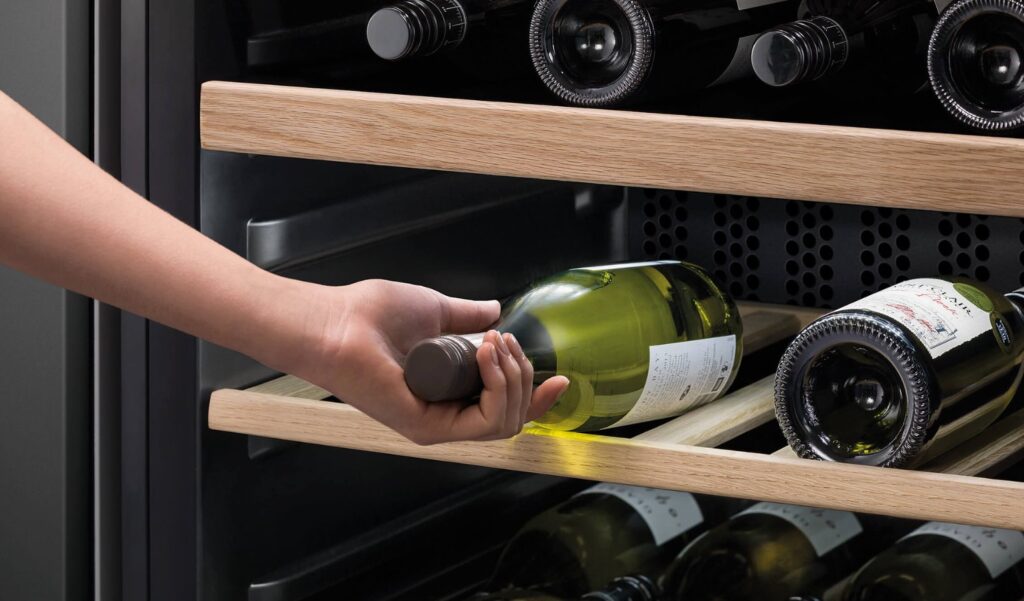
If you’re passionate about wine and have a growing collection of valuable bottles, a wine cooler becomes increasingly important. It ensures that each bottle ages gracefully, preserving its quality and increasing its potential for complexity.
A wine cooler offers several advantages for wine enthusiasts and collectors, making it a worthwhile investment for those who appreciate fine wines and cherish proper wine tasting experience. Here are some key reasons why you might consider buying a wine cooler:
- Temperature control: Wine requires precise temperature control for optimal aging and preservation. Wine coolers maintain a consistent temperature, typically between 45°F to 65°F (7°C to 18°C), ensuring your wines age gracefully and develop their full flavor profiles.
- Humidity management: Wine coolers regulate humidity levels, which is crucial for preserving wine quality. Correct humidity prevents corks from drying out and wine from oxidizing, ensuring the wine’s longevity.
- Protection from light: Exposure to sunlight and UV rays can harm wine, leading to premature aging and deterioration of flavors. Wine coolers are designed to shield your bottles from harmful light, preserving their integrity.
- Reduced vibration: Wine coolers minimize vibrations, which can disturb sediment in bottles and negatively impact wine quality. These appliances have low-vibration compressors to protect your wine from agitation.
- Convenience: Wine coolers provide easy access to your wine collection, making it convenient to select the perfect bottle without disrupting the aging process. They also come in various sizes, accommodating both small and extensive wine collections.
Do you need a wine cooler to store wine?
A wine cooler is not an absolute necessity for storing wine, but it can be highly beneficial for maintaining the quality and aging potential of your wine. The need for a wine cooler largely depends on the type of wine you have, your storage conditions, and your preferences as a wine enthusiast.
In summary, while you can store wine without a wine cooler, having one can greatly enhance your ability to maintain wine in optimal conditions, especially if you’re passionate about wine and want to age it or preserve its quality over time.
Factors to consider when choosing a wine cooler?
Selecting the right wine cooler for your needs involves careful consideration of several key factors:
- Temperature control
Different wines require different temperatures; hence, opt for a model with adjustable temperature settings.
- Humidity regulation
Wine should be stored at an optimal humidity level to prevent cork drying and oxidation.
- Energy efficiency
Look for an eco-friendly option to save on electricity bills.
- Dual-zone or Single-zone
Consider whether you want to store both red and white wines, which require different temperatures.
- Size and capacity
Determine how many bottles you plan to store and the available space in your home.
- Temperature range
Different wines have different storage requirements. Red wines typically thrive at slightly higher temperatures than white wines. Ensure your wine cooler offers the right temperature range for your collection.
- Humidity control
Maintaining the proper humidity level is essential to prevent corks from drying out and spoiling your wine. Look for wine coolers with humidity control features.
- UV Protection
UV rays can be detrimental to wine quality. Wine coolers with UV-protected glass doors or solid doors prevent harmful light from affecting your precious bottles.
- Shelving options
Adjustable and removable shelves make it easier to store various bottle sizes and shapes, including Champagne and magnum bottles.
- Noise levels
Consider the noise level of your wine cooler, especially if it will be placed in a living space. Quieter models won’t disrupt your environment. Some coolers operate more quietly than others, important if you plan to keep your wine cooler in a living area.
Can you use a wine cooler for anything else?
Yes, you can use a wine cooler for various purposes beyond storing wine. Here are some alternative uses for a wine cooler:
- Chilling other beverages: Wine coolers are great for chilling bottled water, soda, sparkling water, juice, energy drinks, lemonade, and even other alcoholic beverages like beer. They provide a convenient way to keep your drinks cold and ready to serve.
- Storing snacks and food: While not suitable for all types of food, wine coolers can be used to store certain foods such as cheese. They are also handy for keeping snacks or appetizers cool when you’re entertaining guests.
- Humidor: Some wine coolers can maintain the ideal humidity levels, making them suitable for storing cigars or as a humidor for cigar enthusiasts.
- Beverage center: Many people use wine coolers as all-around beverage centers, allowing them to store soft drinks, beer, bottled water, and a variety of other beverages conveniently.
- Medicine cabinet: Some wine coolers offer temperature control that can be adjusted to store medicines or medical supplies at the desired temperature, making them a versatile storage option.
- Beauty products: Wine coolers with adjustable temperature settings can also be used to store beauty products that require temperature control, such as skincare items and cosmetics.
- Storing fruits and vegetables: While not as common, some individuals use wine coolers to store fruits and vegetables that do not require refrigeration, like apples and pears.
Keep in mind that wine coolers may have specific temperature ranges and humidity control options, so their suitability for these alternative uses may vary depending on the model.
Always check the specifications of your wine cooler to ensure it meets the requirements for your intended purpose.
Conclusion
In conclusion, the need for a wine cooler hinges on your level of wine appreciation and collection size. While it may not be mandatory for every wine lover, a wine cooler offers the assurance that your investment in wine will be protected and enhanced.
Understanding the essence of wine storage and the importance of ideal conditions is paramount in making an informed decision.
In the world of wine, proper storage and serving temperatures can make all the difference in your tasting experience. Knowing the various types of wine coolers available empowers you to select the one that best suits your needs and preferences.
Ultimately, the choice of a wine cooler type depends on your specific needs, budget, and the size of your wine collection. From compressor to thermoelectric, dual-zone to single-zone, there’s a wine cooler for every enthusiast.
Remember, investing in the right wine cooler is an investment in the enjoyment and preservation of your wine collection.
Our Expertise
Valentina Silovic is a sommelier and content creator with over a decade of experience in the wine industry.
For this article, she collaborated with Dario Drmac, a wine entrepreneur renowned for his innovative digital approach, and Nenad Trifunovic, an esteemed moderator, wine workshop educator, and dedicated advocate for wine-drinking culture.
Their combined experience and insights contribute significantly to the depth and authority of the content presented.
Want to meet the team, seek recommendations, and discover in-depth insights into our product testing and reviews? Click here now!


